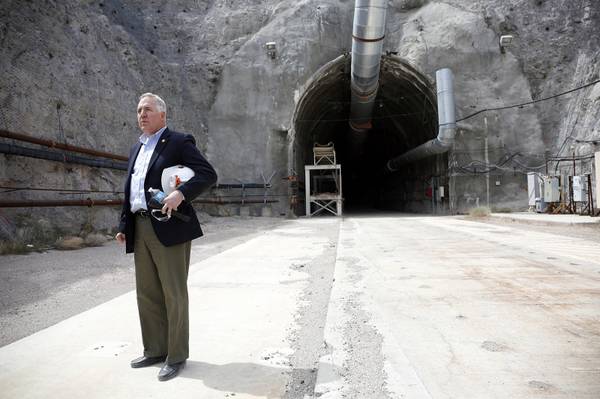Related Coverage
Representatives in Congress are expected to take up a nuclear waste policy bill this fall that deals with issues tied to the Yucca Mountain project.
House Energy and Commerce Committee staffer Andy Zach was in Las Vegas on Thursday to present the congressional outlook on nuclear waste policy and Yucca Mountain. Zach said resuming the licensing process for construction authorization for a Yucca Mountain repository is the most immediate priority.
“We need to fix this,” he said during the RadWaste Summit, a three-day industry event that drew more than 300 participants. “There are a lot of ways that we can move forward. It’s time to do that.”
Rep. John Shimkus, R-Ill., is sponsoring the Nuclear Waste Policy Amendments Act of 2017. Spokesman Jordan Haverly says the bill is expected to come up for a floor vote this fall.
The bill passed out of committee on a 49-4 vote. Haverly said measures that receive support like that would certainly be considered for the suspension calendar, which means it would limit debate and require a two-thirds vote on the floor of the House.
“Whether or not you’re anti-nuclear, we have nuclear fuel that needs to be managed,” Zach said. “We have high-level waste from our defense activities that needs to be managed.”
Despite Nevada’s official opposition, which is contrary to a group of rural counties that want the science heard through licensing, the bill has bipartisan support. More than 60 co-sponsors on the bill include Republicans and Democrats alike.
Provisions in the bill deal with several aspects of nuclear waste policy, including solving an appropriations hurdle that allowed former President Barack Obama and Nevada’s Harry Reid, formerly the Senate majority leader, to choke off funding and mothball the project.
“Fundamentally, the way that the Nuclear Waste Policy Act was set up to pay a fee for a service, you have a contract, you have a fund, that through a series of actions over the last 35 years has been disconnected and been broken and there’s a need to fix that,” Zach said. “Absent the funding reform, quite frankly it doesn’t matter what we do.”
The bill is separate from the appropriations process that could actually put money toward the project. President Donald Trump has requested $120 million for Yucca Mountain.
“(The bill) is not reinventing the wheel,” Zach said. “We’re not starting over. We’re looking at the Nuclear Waste Policy Act, trying to make practical reforms to certain portions of it to make sure we have durable policy.”
A small section of the bill also sets a fixed-term director for the Department of Energy’s Office of Civilian Radioactive Waste Management, Zach said. The director would be able to serve a limit of two five-year terms.
Bob Halstead, Nevada Agency for Nuclear Projects executive director, asked about this section of the bill during the discussion.
“It seems to me that you’re creating something of a federal nuclear waste czar,” Halstead said. “There’s a case to be made for that, I just haven’t heard it.”
Zach said the transferred responsibilities are meant to strengthen the organization, provide some continuity for a project that would span multiple generations if it goes forward, and, hopefully, build trust.
“People who are worried about having a 120-year repository program can say, I at least know that tomorrow I can pick up the phone and call the same person,” Zach said. “In January 2021, you can pick up the phone and call the same person. I think that that strengthens the program.”
Zach said the Trump administration came in and expressed support early on for revisiting the repository process. Energy Secretary Rick Perry’s first trip in his Trump administration role was to the Yucca Mountain site.
Congress is still responsible for funding the process, he said.
“Nuclear waste policy is about the whole country,” Zach said. “We’re all paying, we all have paid for it, we all continue to pay for it, and it really is a matter of national importance.”


Join the Discussion:
Check this out for a full explanation of our conversion to the LiveFyre commenting system and instructions on how to sign up for an account.
Full comments policy